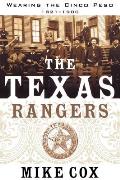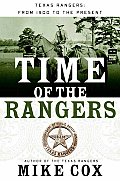
My two-volume history,
The Texas Rangers: Wearing the Cinco Peso, 1821-1900 and
Time of the Rangers: Texas Rangers: From 1900 to the Present, is about men (and now women) who tote guns, not baseball bats.
For those not familiar with the non-baseball-playing Texas Rangers, today they are an arm of the Texas Department of Public Safety (DPS), the Lone Star State's police force. But the Rangers are older than the DPS by more than a century; their historical bloodline traces to the time Texas was still part of Mexico.
That Mexico-Texas connection, incidentally, is where the title for the first volume comes from. Back in the 19th century, before Rangers had standardized badges, they sometimes would have a Mexican silver coin altered to form what became known as the star-in-a-wheel badge. Since 1961, all Texas Ranger badges have been fashioned from Mexican coinage and "wearing the Cinco Peso" has become inside-baseball talk for being a Texas Ranger.
Which gets us back to professional baseball and the fact that in terms of name identification, the Texas Rangers baseball team has really thrown the law enforcement Rangers a curveball. While it's not all that hard to tell who's on first, having a baseball team named after a law enforcement agency causes confusion.
When I worked as a spokesman for the Texas DPS, the Public Information Office regularly received telephone calls from people who thought we were the baseball Rangers. I always wondered if the Ranger baseball club was as good about forwarding the calls they must receive from people looking for the law enforcement Rangers as my staff was in giving the public the baseball club's phone number.
This branding problem does affect the law enforcement Rangers, but it is personal as well. Every time I check Google to see what's being said online about my books, I have to sort through sports stories and blogs about those other Rangers. And, quite often, when my Ranger books come up in a conversation, I have to explain that I have written about the law enforcement Rangers, not the baseball Rangers.
Football's my favorite sport, not baseball, but I have nothing against the Texas Rangers baseball team other than their name. Why couldn't they have decided to call themselves something else? Couldn't they have been the Tall Texans, the Trail Drivers, the Dallas-Fort Worth Drovers, the Texas Tumbleweeds, the Roughnecks, the Wheeler-Dealers or some other Texas-related name?
Sure, they could have come up with some other name. But if I owned the club, I probably would have chosen to call them the Texas Rangers. The reason is the iconic power of those two words, "Texas Rangers." The owners of the baseball club, when it moved from Washington, D.C., to Texas in 1972, wanted to capitalize on a Texan and American icon, a name almost anyone recognizes. And they did.
 During World War II, as I explain in volume two of my history, the Nazi propaganda machine went into overdrive to overcome public anxiety at an erroneous wire service report that Texas Rangers had invaded France. Turns out it was the U.S. Army Rangers, not the Texas Rangers.
During World War II, as I explain in volume two of my history, the Nazi propaganda machine went into overdrive to overcome public anxiety at an erroneous wire service report that Texas Rangers had invaded France. Turns out it was the U.S. Army Rangers, not the Texas Rangers.
The Texas Rangers got another name-recognition boost with the Lone Ranger series on radio and later television. Walker, Texas Ranger was another shot heard nationwide in the 1990s.
I have been to only a couple of Texas Rangers games, but I have spent a lot of time with the real Texas Rangers over the years. My association with the Rangers began in the late 1960s, when I began working as a newspaper reporter.
I met Rangers while covering murders, jail breaks, and oil-field vandalism related to labor issues for the San Angelo Standard-Times in West Texas. After moving to Lubbock in 1969 to work for the Avalanche-Journal, I dealt with other Rangers. When I came home to Austin to be a reporter for the American-Statesman, I had more interactions with Rangers.
In 1985, I decided to leave newspapers and was hired by the DPS to deal with the news media. In 1991, I took over as head of the public information office and continued in that capacity until late 2000. By that time, I had many friends in the Rangers.
For a time, I also was a member of the Former Texas Rangers Association (FTRA) Foundation's board of directors, and I continue to serve as historian for the FTRA.
Despite my long association with the Rangers, a connection which clearly gave me a leg up in writing my two-book Ranger history, I have endeavored to stay objective in my reporting. With apologies to Clint Eastwood, whom I met when he came to Austin to play a Texas Ranger captain in his film A Perfect World, I told the good, the bad, and the ugly when it comes to the Ranger story.
In looking at their long history, it's clear that the Rangers, to fall back on baseball talk, have not always played by the rules. They've hit some foul balls and worse, but they've also made plenty of home runs, from saving children kidnapped by hostile Indians to, in modern times, solving decades-old cold cases.
There's an old Texas expression that some men just need killing, but sometimes, particularly in the frontier days, it was a Texas Ranger, not a judge and jury, who decided whether someone needed killing. Sometimes, people don't need killing.
The last period of occasional bloody excess on the part of the Rangers was nearly a century ago, when the Mexican Revolution broke out in 1910. Even then, it was 1915 before things really got out of hand on the Texas-Mexico border.
In 1919, the Rangers were the subject of a protracted legislative hearing in Austin, and the organization emerged from the process under better command and control. Still, problems born of politics continued off and on until the early 1930s. Finally, the creation of the DPS in 1935 led to the professionalization of the Rangers.
Interestingly enough, it is Texas's border with Mexico that may again cause new problems for the Rangers. While Mexico seems safe from another revolution, the drug wars under way along that republic's northern frontier are causing the most bloodshed Mexico has seen in nearly a hundred years. Texas officials are worried that violence may spill over into the U.S.
Modern Texas Rangers, wearing camouflage and carrying automatic weapons, are once again patrolling the Rio Grande, looking for trouble they are likely to find. When the first shootout occurs and headlines are made, I can almost guarantee that someone, somewhere, will say to themselves, "What are baseball players doing down on the border?"